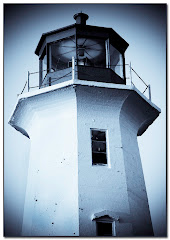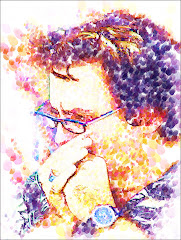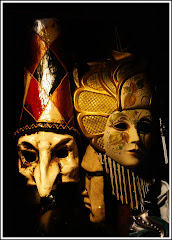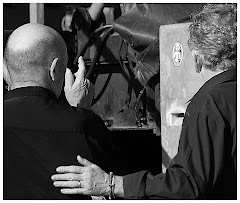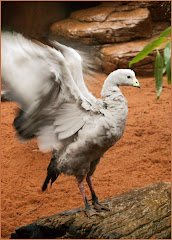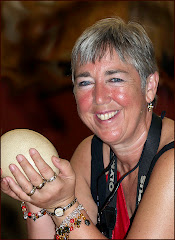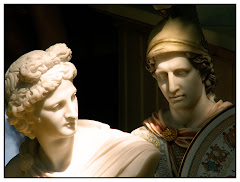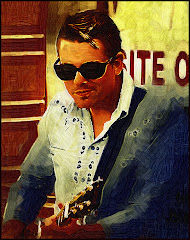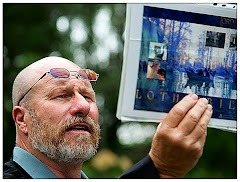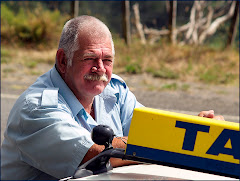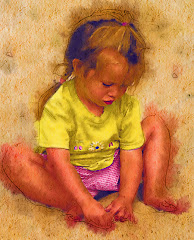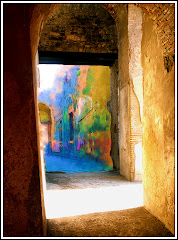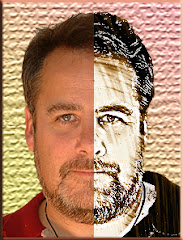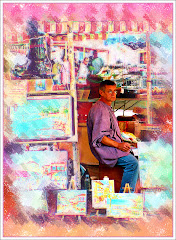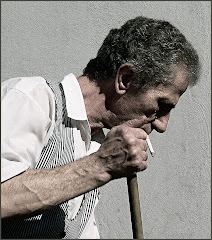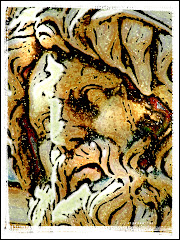 They are literally “people of the river.”
They are literally “people of the river.”There are no highways to connect the tiny towns of the Amazon. People use boats like we use cars and they use riverboats like we use busses. People here seem to be in a constant state of motion.
You see the boats travelling up and down this ancient river at all hours of the day and the night. In Santarem, we dock in a place that serves as a terminal for riverboats. I have no idea how many of them loaded, left, unloaded and returned while we were there. But it was a lot.
Surrounding the river terminal is no-nonsense fencing. The fence is topped with razor wire and there are armed guards here. You don’t get through the terminal without showing ID to the sweaty soldier with the machine gun. I don’t want to think about what it would be like to be a brown skinned person who forgot their ID. Nope. Won’t go there.
 The presence of tourists in Santarem isn’t unwelcome – but it’s not welcome either. People are interested in seeing us, partially because our cruise ship is so much grander than the ancient chugging riverboats, all of which remind me of the African Queen from the classic Bogart film.
The presence of tourists in Santarem isn’t unwelcome – but it’s not welcome either. People are interested in seeing us, partially because our cruise ship is so much grander than the ancient chugging riverboats, all of which remind me of the African Queen from the classic Bogart film.They watch us carefully. If we catch them looking at us, they smile and wave – but there is the strong sensation, for me anyway, that we are at best a curiosity. At worst? Intruders, maybe. Some look at us like a wary guard dog might eye an intruder who is not quite a stranger…and just may be bearing gifts.
As we glided into the port today, people lined the shore to watch our progress down the Amazon. Cars pulled over to the side of the road. People stood there. Some waved. Most didn’t. They stood silently and watched. Tourism makes up less than 5% of the local economy – so seeing a boatload of us is unusual enough to be considered an event.
We started our Malarone, the anti-malarial drug, last night. We had significant misgivings about this.
 We are booked onto a riverboat for a tour down the river. It will take most of the day. We try to avoid long excursions...but considering the storm clouds forming in my head, being on a cool river instead of tramping through the jungle seems like a good idea.
We are booked onto a riverboat for a tour down the river. It will take most of the day. We try to avoid long excursions...but considering the storm clouds forming in my head, being on a cool river instead of tramping through the jungle seems like a good idea.
I woke up with a headache – one of those “behind the eyes but could turn into shooting pains through your temples” headaches. As the morning passes, the pain behind my eyes gets worse, but I try to ignore it. Since I have not had one of this sort of headaches before – I have to put it down to the Malarone.
 The boat chugs down the river and the guide chats on. He’s glad to be in a place where he can use his English – which he speaks very well. We go down the river and, as we do, Sheree whispers to me that it feels a bit like a theme park in Disneyland.
The boat chugs down the river and the guide chats on. He’s glad to be in a place where he can use his English – which he speaks very well. We go down the river and, as we do, Sheree whispers to me that it feels a bit like a theme park in Disneyland.She’s right.
On either side of the boat are Brazilians throwing weighted nets into the water. I have the sneaking suspicion that this is so tourists on both sides can get pictures. A little further on, there is a man spear fishing. He waits until the boat is beside him before casting his spear. Then he turns and waves cheerily at the boatful of tourists pointing cameras at him.
 We pass by families, conveniently situated by the shore and I have the sudden impression that we are passing through a zoo. Don’t take this the wrong way: I simply mean that these people look too easily available to be real.
We pass by families, conveniently situated by the shore and I have the sudden impression that we are passing through a zoo. Don’t take this the wrong way: I simply mean that these people look too easily available to be real.We even go piranha fishing. Each person gets a piece of wood and a line. At the end of the line is a hook and a piece of meat is put on the hook, said hook thrown into the water. Again: I suspect this is so Aunt Mazie can tell the folks back in Iowa that she went fishing for piranha on the Amazon.
A surprised woman does catch one and hauls it it.
“It’s a BLACK piranha,” our guide enthuses. “You see silver. Sometimes red. But hardly ever BLACK.”
The woman swells up with pride and drinks in the attention. Shutters click as she displays the still floppy fish at the end of her line. I don’t like this much, I decide. My impressions might be influenced by the steady tightening of everything inside my head, but it really feels “put on” to me.
So, after fishing, I strap the telephoto onto my camera and look for the real pictures.
 Let’s look at them together, okay? We’ll pretend you are standing beside Sheree and me and we’ll look at the faces of the people of the river together. I’ll point them out with my camera and you can just pull up one of those white plastic lawn furniture chairs on the riverboat and settle in for the balance of the tour.
Let’s look at them together, okay? We’ll pretend you are standing beside Sheree and me and we’ll look at the faces of the people of the river together. I’ll point them out with my camera and you can just pull up one of those white plastic lawn furniture chairs on the riverboat and settle in for the balance of the tour.This woman stood at the rail of her riverboat and ignored us the entire time.
Our guide told us that the riverboats are full of hammocks -- and the more ornate your hammock, the higher your status. The guide told us that 70% of Brazillians are conceived in hammocks. (They must have very good balance as well as a dogged determination.)

There were dozens of people on the deck looking us over. This man peered at us from behind a window. At first I barely saw him...then I realized he was looking right at me. I'd seen him just a few minutes earlier with some children. Here he was again. What an interesting face you have, I thought.

There were dozens of people on the deck looking us over. This man peered at us from behind a window. At first I barely saw him...then I realized he was looking right at me. I'd seen him just a few minutes earlier with some children. Here he was again. What an interesting face you have, I thought.
After a took the picture, I raised the camera to him and smiled.
He smiled back and wandered off into the back of the riverboat.
When we get back to the ship, I find I am having a bit of a hard time walking. My head is throbbing and the pressure in my temples and behind my eyes just makes me want to lie down in a cool place. It is literally a 'splitting headache.' Sheree has one too – but that doesn’t stop her from shopping a little at the kiosks the locals have set up.
We return to the cabin and turn out the lights and try to lie perfectly still.
Several hours pass. Finally Sheree stirs and starts getting dressed. I have found a position where my head doesn’t hurt and I ask her where she is going.
She wants to take a walk – just outside on the pier. I check my watch. The boat leaves in 45 minutes and at first, I decide to let her go without me. Then my desire not to waste this port and the time I can spend with Sheree in it takes over and I get dressed.
The walk is ethereal. The fresh air clears my head a little, but I need to concentrate on the ground in front of me and the world has taken on a certain glow. Fortunately the lights are no longer too bright since dusk is falling over the Amazon.
We walk outside the safety gates, past the guard and past the razor wire. All the tourists are back on-board now and we resolve to stay close to the ship. Again the sensation of being watched is strong. People are clustered near the gates to the terminal. I am not sure what they are waiting for. Most silently look at us as we leave the safety of the terminal. As we walk away, some still watch us. It's not uncomfortable, but the sense of being from 'way out of town' is very strong.
Inside the terminal, laughing workers are taking down all the tourist stuff: the gangplank, the signage and the little huts they sell crafts from.
We pause outside, take some pictures. Then the boat blows it’s horn and we make our way back on board, through the throngs of locals, past the razor wire, and onto the ship.
As we pull away, I have a slightly sad feeling. I never really had a chance to know anything about the real Santarem. I was physically here – but I haven’t BEEN here.
I think I would like to go back one day...without the Malarone.




